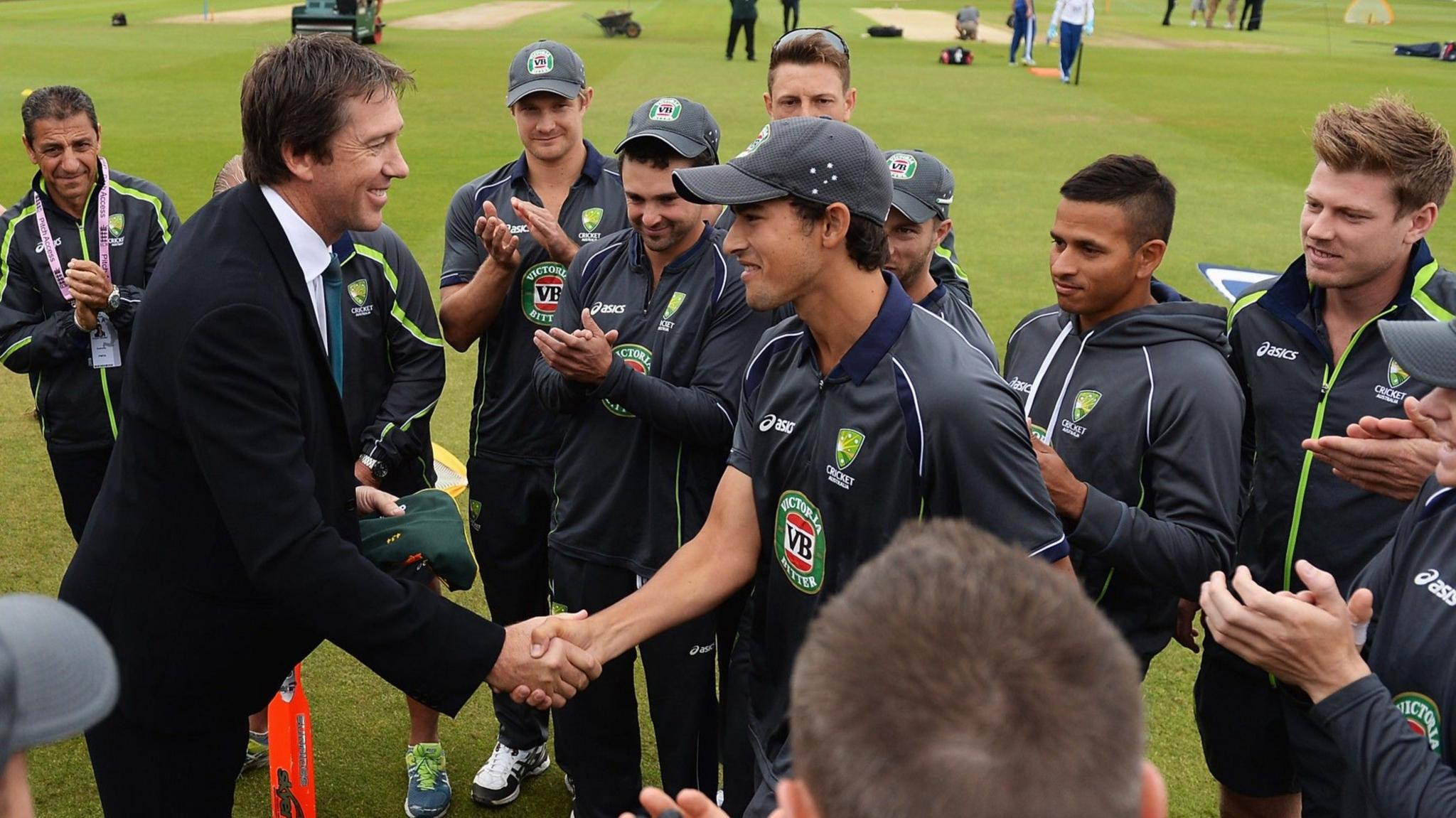From the Ashes is a series of features and podcasts which dig deeper into stories from cricket’s fiercest and most legendary Test series. Full interviews can be found on BBC Sounds, building up to ball-by-ball coverage of the first Test between Australia and England in Perth on Friday.
Like a lot of good stories, this one starts in a pub.
The pub was in Worcester, but that part isn’t important.
«I was sitting with Michael Clarke and Brad Haddin,» Ashton Agar tells BBC Sport. «That was pretty cool in itself.
«Clarke said: ‘Are you ready to go, youngster?’ I thought he meant move on to the next place.
«He said: ‘No, for next week.’ I knew exactly what he meant. I said ‘yes’, with conviction, and there were no other thoughts in my mind.»
Agar was an almost unknown 19-year-old spinner who had just been told by Australia captain Clarke he was in line for a debut in the first Ashes Test of 2013 at Trent Bridge.
When the news broke and Agar was presented with his baggy green cap by Glenn McGrath, Cricket Australia’s own website called it «one of the biggest Ashes bombshells in history».
There was so much more to come. The 98 Agar swaggered his way to on the second day in Nottingham remains the highest score by a number 11 in Test cricket.
Even the late Queen Elizabeth spoke to Agar about it. Agar only played two Ashes Tests, yet has his own place in the story of cricket’s greatest rivalry.
For Agar to be in that pub in Worcester was the result of a chaotic time in Australian cricket history.
He made his debut for Western Australia earlier in 2013. After two games in the Sheffield Shield, Agar came within a whisker of making his Australia bow on an awful tour of India.
The Australians lost 4-0, coach Mickey Arthur fell out with some senior players over their refusal to do ‘homework’, and things were unravelling before the Ashes.
It got worse in England. Australia lost all three of their matches in the Champions Trophy, David Warner punched Joe Root in a Birmingham bar and Arthur was sacked. In came Darren Lehmann. So did Agar.
The initial plan was for Agar to play some club cricket for Henley in the Home Counties League, then join the Australia A tour. Both happened. The unplanned part was being added to an Ashes squad that included one specialist spinner in Nathan Lyon.
«The main training session was two days before the first Test,» says Agar.
«I was walking off the training track in the middle, back to the dressing rooms, and Rod Marsh, the selector, walked up to me and said: ‘Ash, go and call your parents, you’re in.’
«I called mum and dad back in Melbourne. That was an amazing phone call. Mum was in tears, my two brothers were yelling and dad could hardly speak.
«They got on a flight from Melbourne that night. They got straight into a taxi and made it to the ground with a minute to go before my cap presentation.»
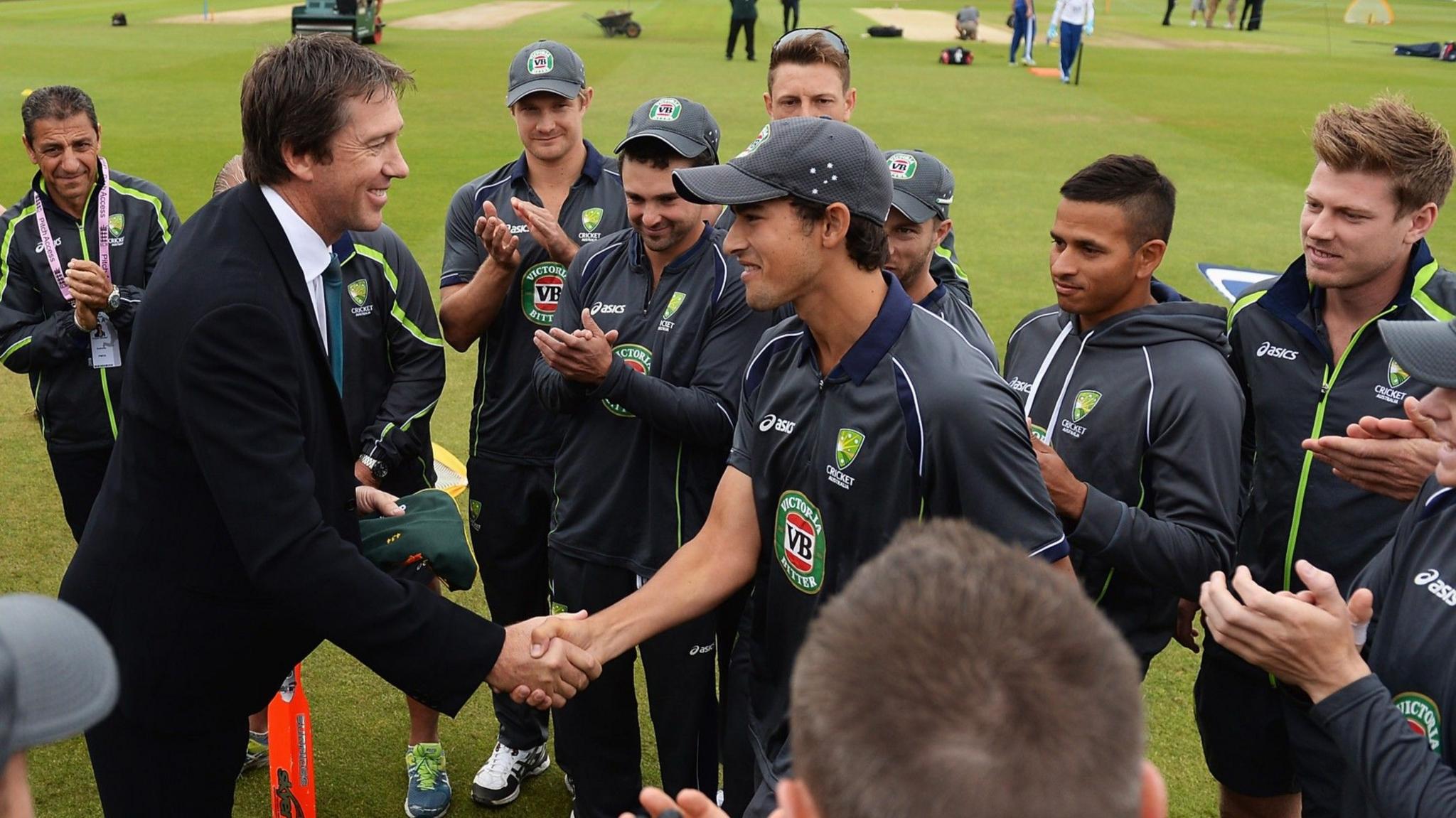
Agar was 19 years and 269 days when he pulled on his baggy green. Only two Australian men have done so at a younger age this century – Pat Cummins and Sam Konstas.
«It was huge because it was so unexpected,» Agar says. «We kept it extremely quiet. The whole point was for it to be a surprise factor, because England wouldn’t have really known anything about me.»
Beyond the «bombshell», Agar had a quiet first day. He bowled seven uneventful overs as England were bowled out for 215 – Peter Siddle took five wickets.
«It was everything I’d seen on TV,» says Agar. «A packed house. Jerusalem was a spine-tingling moment. When they play that, you feel pretty small.
«I knew exactly where my family was sitting for the whole five days and I kept thinking of them. If I felt like I needed to feel some support, I looked for them. That was really nice.»
Things started to go awry later in the day. Australia were reduced to 75-4 at the close by Steven Finn and James Anderson. Anderson bowled Clarke with one of the most memorable deliveries of his illustrious career, a bail-trimming out-swinger.
«It felt like Anderson was swinging the ball three different ways,» says Agar.
«The chant ringing in everyone’s head was the Jimmy Anderson chant. Michael Clarke got out to that ball, he got in the dressing rooms and he was singing it because it was so stuck in his head.»
Inside an hour on the second morning, Australia found themselves 117-9, 98 behind. Agar, the teenager who was not supposed to be on the tour, walked out to bat.
«It felt like the ground was moving from side to side because of the chants,» he says.
«It was so loud. In a stadium, when everyone is chanting, it always feels like one side of the ground is slightly out of sync with the other one – like seaweed swaying in a current under the ocean.
«I just wanted to get through my first ball. I didn’t want to get a golden duck.
«I blocked Graeme Swann, then got a single. It massively put me at ease. Then everything happened from there.»
-
‘Sea legs meant I couldn’t bowl’ – when England travelled to Australia by boat
-
7 days ago
-
-
‘Without 2002-03 there was no chance of 2005’
-
27 October
-
-
The ultimate Ashes competitor – Broad on walking, Warner and that final wicket
-
20 October
-
-
‘Ball of the century? That was my job’ – Ashes ‘rhino’ Harris
-
4 November
-
Agar could have been stumped on six off Swann, but got the benefit of a hairline decision.
«It felt pretty out and I was lucky I got my foot down just in time,» he says. «It could have gone either way.»
What followed was some of the most astonishing, elegant and clean ball-striking you could see from any Test batter, let alone a 19-year-old number 11 on debut.
«At the start Phil Hughes was taking more of the strike, then Boof [Lehmann] ran out a message for him to back me,» recalls Agar.
«Every single ball I was on strike he would come down and say ‘next ball, next ball, next ball’. He was even stronger on that the more runs I hit. It was a real lesson in how to stay present.
«Kevin Pietersen gave me a mouthful. I can’t remember what he said, but I laughed at him. I was 19 and he was an experienced player trying to intimidate me. It didn’t matter. I was out there batting 11, just trying to have a crack.
«Anderson and Stuart Broad had a word, there were chirps from Matthew Prior behind the stumps. They were into me, but never abusive. It was meant to make it uncomfortable, which is exactly what you should do to a 19-year-old out there for the first time.»
Anderson was driven back down the ground for four. Finn dropped short and was pulled through the leg side. Swann was lofted over long-off for six by a languid swish of Agar’s blade.
Runs flowed and England became ragged. Agar’s score caught up with that of Hughes, Australia’s number six. Agar’s half-century came up in only 50 balls. «Well done, young man,» said television commentator Ian Botham.
«These are not the shots of a number 11,» added Botham, as if he was being pranked by the whole of Australia as payback for his own Ashes exploits.
«It’s hard to describe the feeling,» says Agar. «The occasion faded away. The only reference point I had was my family. I looked at them every ball.
«Ayrton Senna said it once about driving. He said it’s like having God’s hand on your brain.
«You don’t know how it’s happening, but it just happens. All of your knowledge and skill just comes out at one time, and that’s what it felt like. It felt like God’s hand on my brain, that all of my subconscious was being unlocked at once.»
The last-wicket pair wiped out the deficit. Agar took lunch on 69.
«They had these little rice pudding things in plastic cups,» says Agar. «I had way too many on that tour. They were delicious.
«I tucked into a nice lunch, then it was time to go out there again. Phil Hughes had a steely look in his eyes. That’s the thing I remember about him that day.»
The records were ticked off: what was then the highest 10th-wicket partnership in Test cricket. When Agar went past 95, he beat Tino Best’s record for the highest score by a number 11, set against England at Edgbaston a year earlier.
By this point, even the home fans were on Agar’s side. Cameras captured the worried look on the face of England captain Alastair Cook. His plans were in tatters, fielders scattered to all corners of Nottingham.
Agar, on 98, was within one hit of a fairytale century. Broad dug in a short one, Agar swung for the leg side and Swann swooped for the catch.
Deflation.
«I absolutely smashed it,» says Agar. «I should have hit it up, but I tried to hit it down. I just wanted to get there and I was going to do it in the way I got all of my other runs.
«It went a bit quiet for a moment. You’d think the crowd would be elated, but they were really disappointed.
«I just shrugged my shoulders and had a side-smile on my face. Swann sprinted up to me. He was the first one to congratulate me. All of the English players did. I got a massive standing ovation from the crowd. Pointing my bat to my parents was cool.»
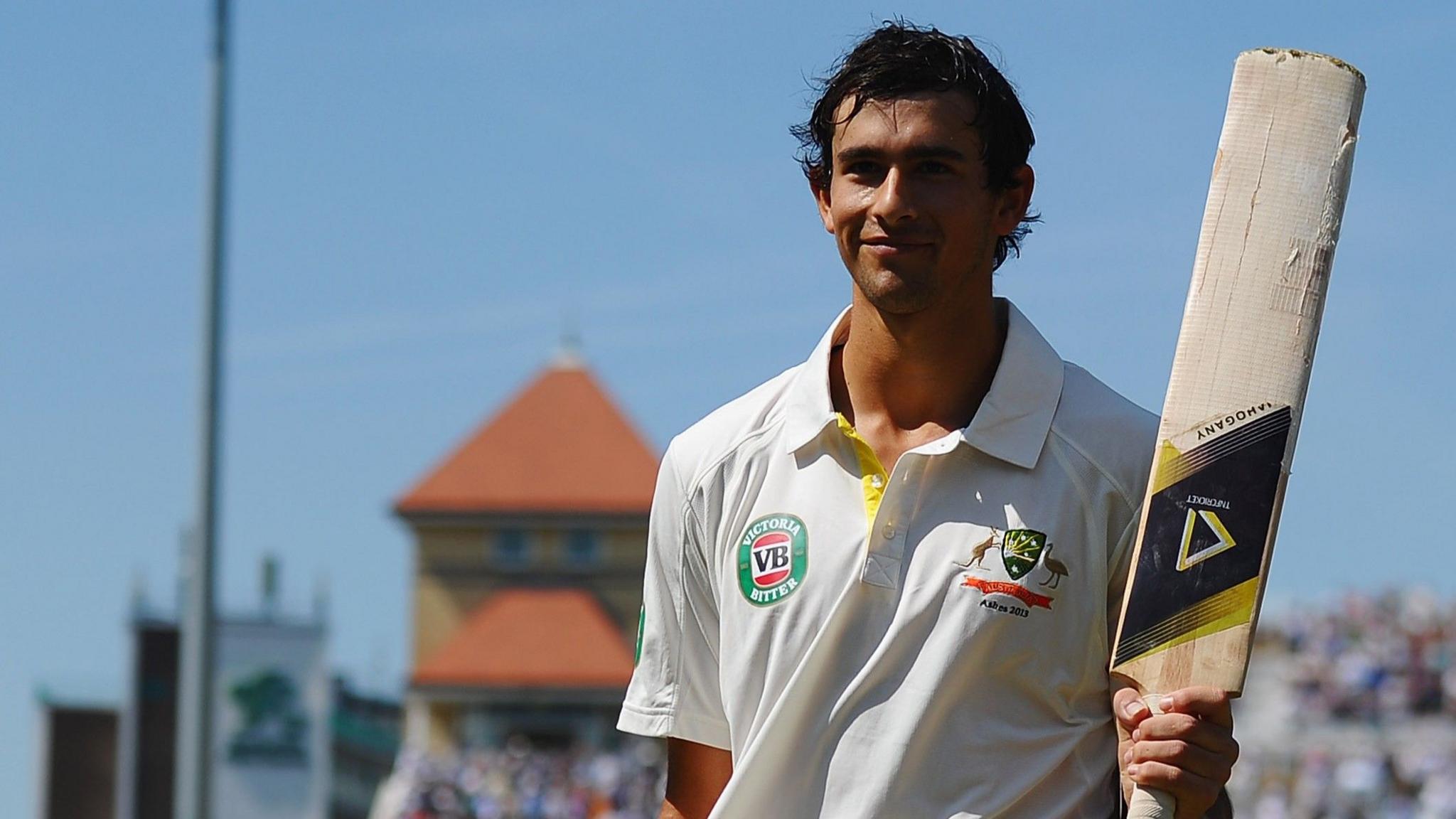
In two and a quarter hours at the crease, Agar had become a superstar. Australia prime minister Kevin Rudd tweeted congratulations. Agar’s parents were live on Test Match Special at tea.
Despite the attention, Agar was focused on the job he had been picked to do. He wanted a wicket. Two came the following day – Cook and Jonny Bairstow – but it was the wicket Agar did not take that has a place in Ashes folklore.
Agar was the bowler when Broad refused to walk after his edge nestled in the hands of Clarke at slip, via a deflection from the gloves of wicketkeeper Haddin.
«I just walked down the wicket to celebrate,» says Agar. «Michael Clarke had his finger up. I was so confused as to what was happening. I couldn’t understand how the one bloke with the best view, Aleem Dar the umpire, didn’t think it was out.
«I was fielding at short cover and said to Broad ‘you smashed that, didn’t you?’ He said he did. It was friendly. Everyone gets into Broady for not walking, but I wouldn’t have walked. Cricket is hard and you need luck. That luck potentially changed the Test.
«Aleem Dar apologised to me the next morning. He shook my hand and said: ‘I’m sorry, young man, that was a bad decision.’ I respect him for that.»
Broad’s runs were a huge factor in England winning a classic by only 14 runs. Agar did not take another Ashes wicket, struggling with his action and a cut finger in the second Test at Lord’s.
«My finger was ripped to pieces and I was in a lot of pain trying to bowl,» he says. «I knew my action was falling apart.
«It was so hard to deal with mentally. You have to be pretty resilient as a 19-year-old trying to bowl in a Test knowing you’re nowhere near your best.
«It was so difficult being out there at Lord’s wishing I wasn’t bowling. It was a pretty lonely place.»
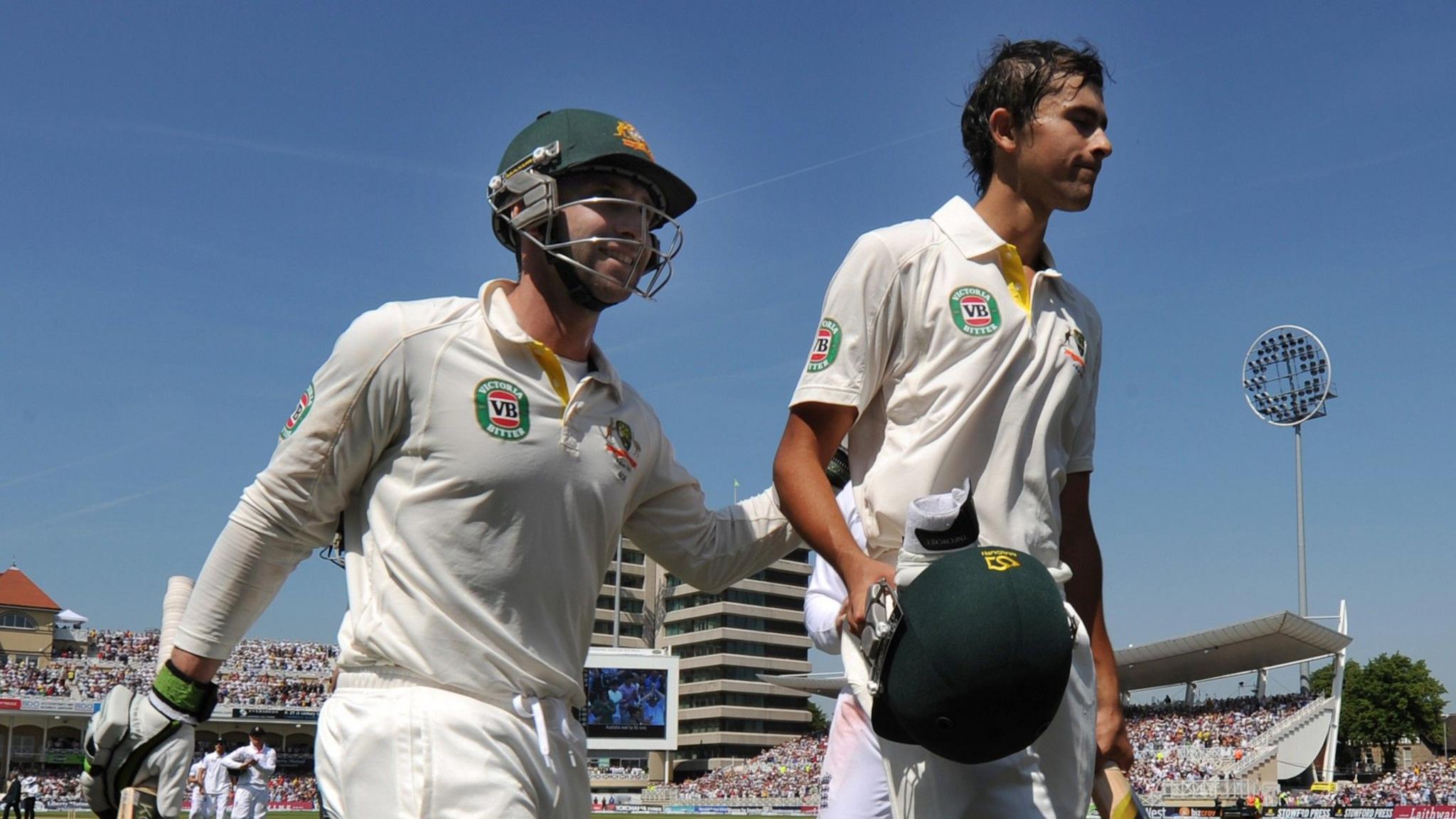
Still, that second Test created another special moment.
«The best part was meeting the Queen,» says Agar. «Michael Clarke introduced her to everyone and we had to address her as ‘your majesty’.
«She came to me, shook my hand and said: ‘This is your first time here, isn’t it?’ I said: ‘It is.’
«She said: ‘Good luck, have a good time.’ I could not believe it. The Queen knew it was me.»
Agar was «relieved» to be dropped after the second Test. The third, at Old Trafford, was the beginning of Lyon’s 100 consecutive Tests. Agar, now 32, played three more Tests, none of them in the Ashes.
Hughes, Agar’s batting partner on that day in Nottingham, was killed on the field little more than a year later, struck by a fatal blow to the neck batting in a Sheffield Shield match.
«I feel very lucky to have shared that with him,» says Agar. «I had a photo of Phil up on my bedroom wall, playing one of his signature cut shots. Me and my brothers loved Phil.
«I was batting with someone I looked up to. Getting to share one of the biggest moments of my life so far, and learning about resilience, staying present and what that does in terms of performance is a huge lesson.
«He showed me that in real time. It was a special time we spent together. He was a beautiful man.»
Two days after Hughes passed away in November 2014, Agar was playing in Perth for his club side University.
He was out for 98.
«It was spooky, actually,» says Agar. «There was a big 408, his cap number, painted on the ground and there was a minute of silence. It was tough.
«I remember feeling quite focused. I was thinking about our innings, what he was telling me at that time. On 98 I nicked a ball to second slip. It was nice it happened that way.»
98. The number for which Agar’s Ashes career will forever be remembered.
«I’ve never thought about the two runs I didn’t get,» says Agar.
«The feeling for me has never changed. It has never been regret or disappointment.
«I’m just really happy for what happened that day.»
The Ashes: Australia v England
21 November 2025 – 7 January 2026
In-play clips and highlights on iPlayer, BBC Sport website and app. Ball-by-ball commentary on BBC Sounds, BBC Radio 5 Sports Extra and the BBC Sport website and app, which will also have live text commentary and daily features and analysis
Related topics
- Australia
- The Ashes
- Cricket
-
The ultimate Ashes competitor – Broad on walking, Warner and that final wicket
-
20 October

-
-
‘Sea legs meant I couldn’t bowl’ – when England travelled to Australia by boat
-
7 days ago
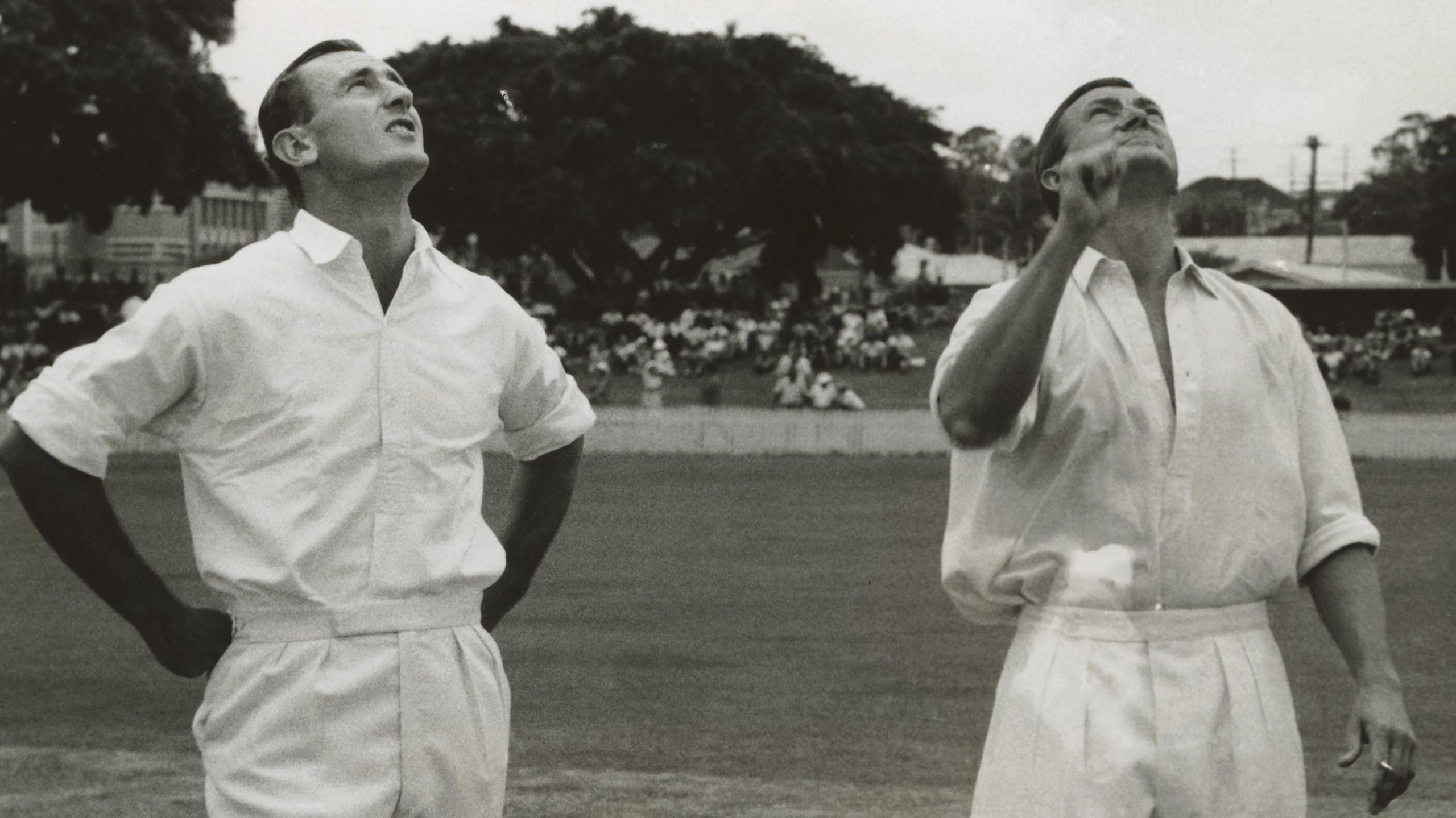
-

